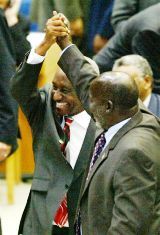Settlement in sight in one of Sudan’s conflicts
WASHINGTON, Dec 22, 2004 (AP) — Suffering continues in war-ravaged western Sudan . But to the south, after 21 years of conflict, things are looking up.

|
|
Sudanese Vice President Ali Osman Taha, left, holds hands with Sudan People’s Liberation Movement leader John Garang, right, Friday, Nov. 19, 2004 during the U.N Security Council meeting in Nairobi, Kenya. (AP). |
The Islamic government in Khartoum may be ready to initial a peace agreement with southern Sudanese rebels on or before a Dec. 31 deadline. There might even be a formal signing ceremony in Washington if all goes well during the next month.
That can come, however, only after the government and the southern-based Sudan People’s Liberation Movement work out some pending questions.
U.S. officials consider the two conflicts linked, exacerbated by government policies, and they say unless the situation in western Sudan ‘s Darfur region changes for the better, the proposal for a Washington ceremony will be off the table.
Progress in Darfur is no less important than it is in the North-South conflict, says Michael Ranneberger, the No. 2 official in the U.S. State Department’s African affairs bureau.
“The two situations are inextricably related and must be resolved in tandem. There are two tracks, but they must lead to the same place: peace and change in Sudan ,” Ranneberger said in the speech last week.
In Darfur, the Sudanese government and Arab militias that it supports are battling two black African Muslim rebel groups. The toll on civilians has been horrific; new U.S. estimates indicate that 2 million people -overwhelmingly black Africans -have been uprooted from their homes during the 22-month conflict.
There is hardly an issue on which Secretary of State Colin Powell has spent more time since last spring than Darfur. The results have been meager, but a hopeful sign is a Sudanese government commitment this past weekend to observe an often-violated cease-fire that was signed last April.
Partly under pressure from domestic American constituencies, Powell also has pushed hard for settlement to the North-South conflict in Sudan .
The war has generated interest from U.S. evangelical Christians offended by the suffering inflicted on the Christian population of southern Sudan by Khartoum’s Arab-dominated armies. Also, American civil rights groups are outraged by slave conditions under which some in the south and west suffer.
Many Americans are familiar with the war-induced plight of the southern Sudanese thanks to the testimony of special category of Sudanese, numbering 3,700, who were allowed to resettle in the United States.
Known as the “Lost Boys of Sudan ,” they were left homeless and orphaned by the war and walked, barefoot, more than 1,900 kilometers (1,200 miles) in the deserts and jungles of Sudan and Ethiopia in search of refuge before finding it in Kenya.
They were the lucky ones, compared with many of their compatriots. An estimated 2 million Sudanese have died in the North-South conflict, mostly from famine caused by the fighting and displacement. That far exceeds the combined numbers of American war dead during the past century.
Some of the Sudanese who died were companions of the “Lost Boys.” Death often resulted from drowning, attacks by wild animals or militia groups, hunger, dehydration or fatigue.
And the estimated 4 million internally displaced southern Sudanese dwarf those of all other conflicts in recent decades.
With peace now in prospect, many uprooted Sudanese are planning to return home. In preparation, the World Food Program of the United Nations is expanding operations in the region.
U.N. officials also are attempting to put together an international force of between 9,000 and 13,000 to help ensure that the peace pact holds. The southern Sudanese also can expect hundreds of million of dollars in international assistance next year, based on donor country pledges.
Under the agreement now being worked out, power in southern Sudan will largely be in the hands of local authorities. Agreements also have been reached on the sharing of oil revenues and other natural resources.
Some vital issues remain. There is no agreement on who will pay for feeding and housing the southern Sudanese army once the war officially ends.
But rarely have the prospects for peace been brighter for a region that has known only one decade without war since independence in 1956.
